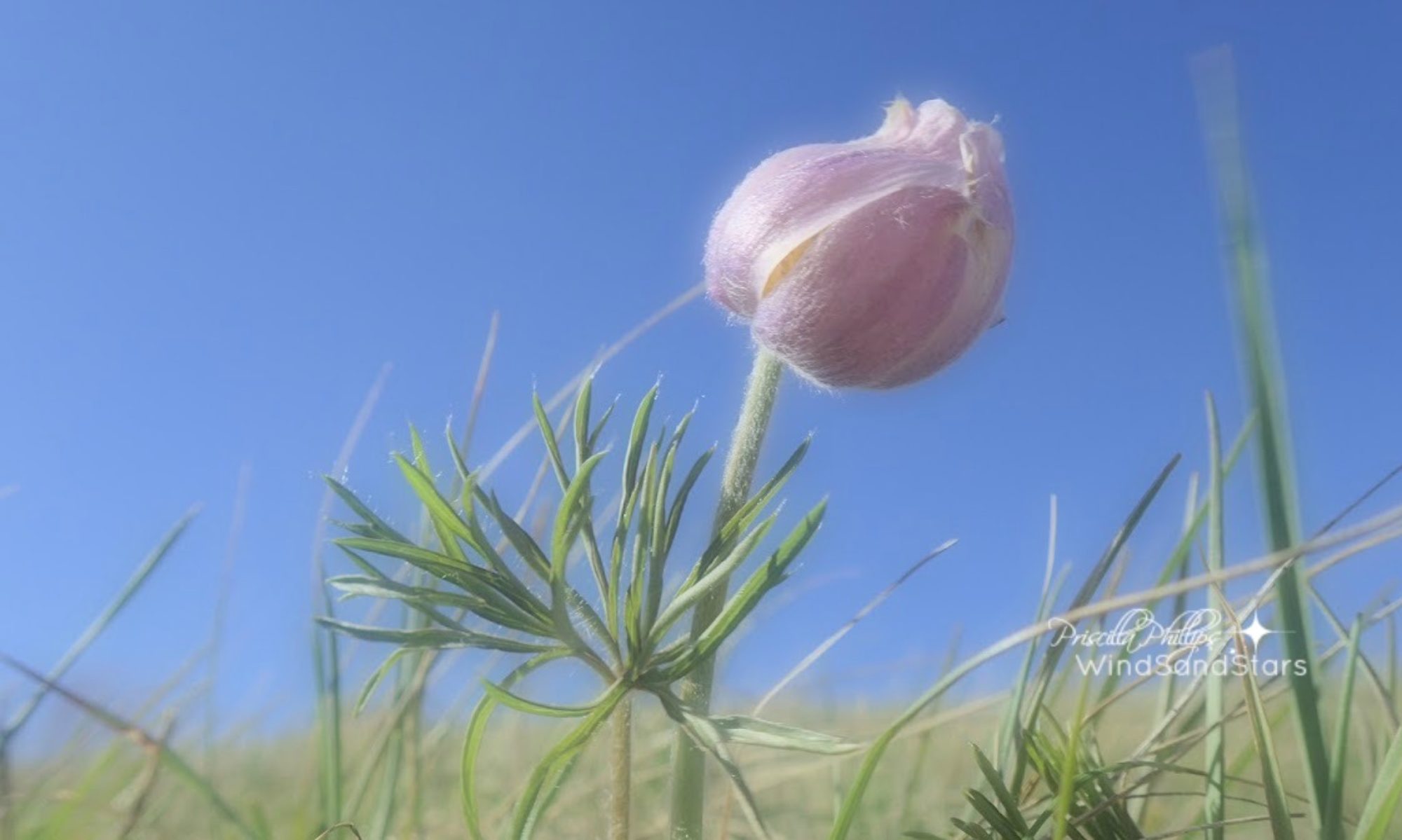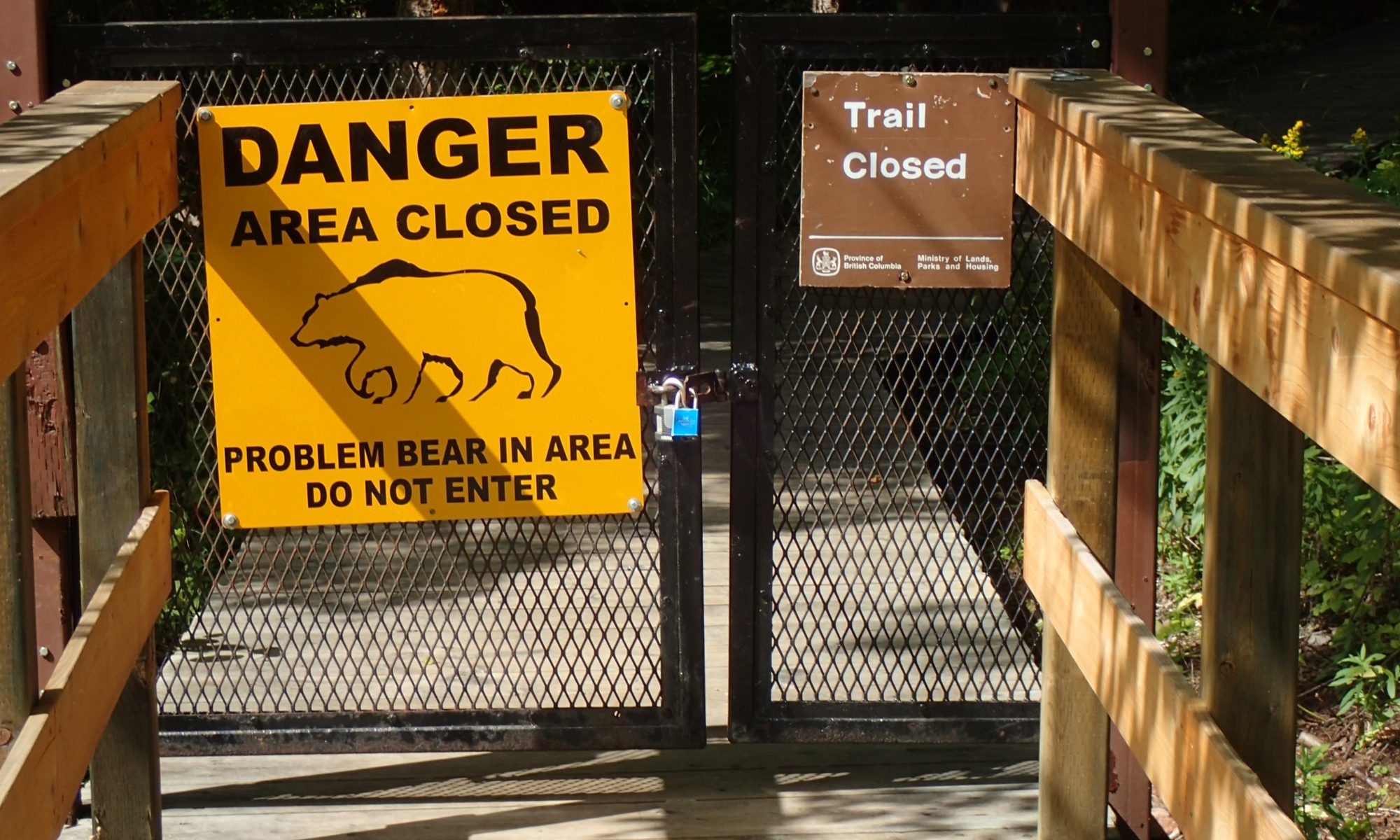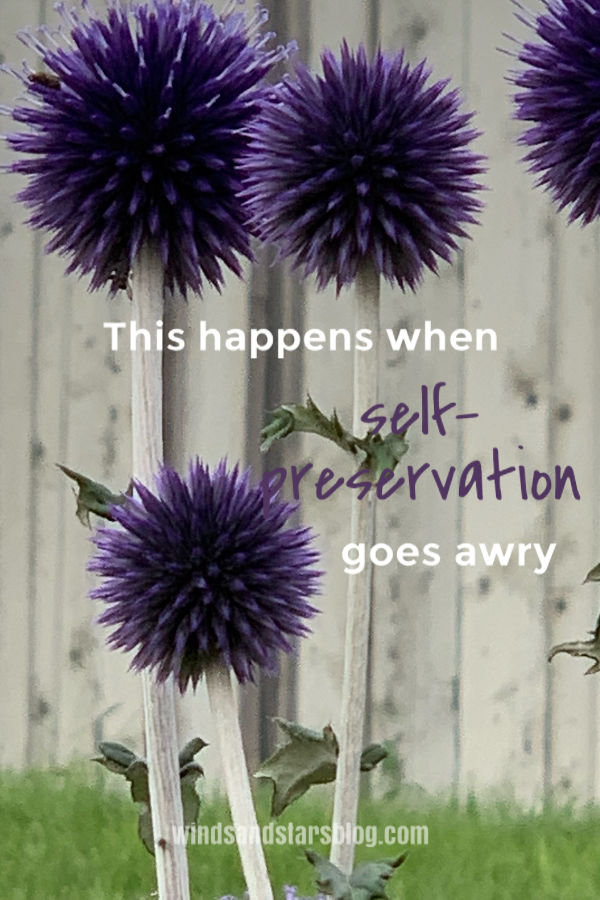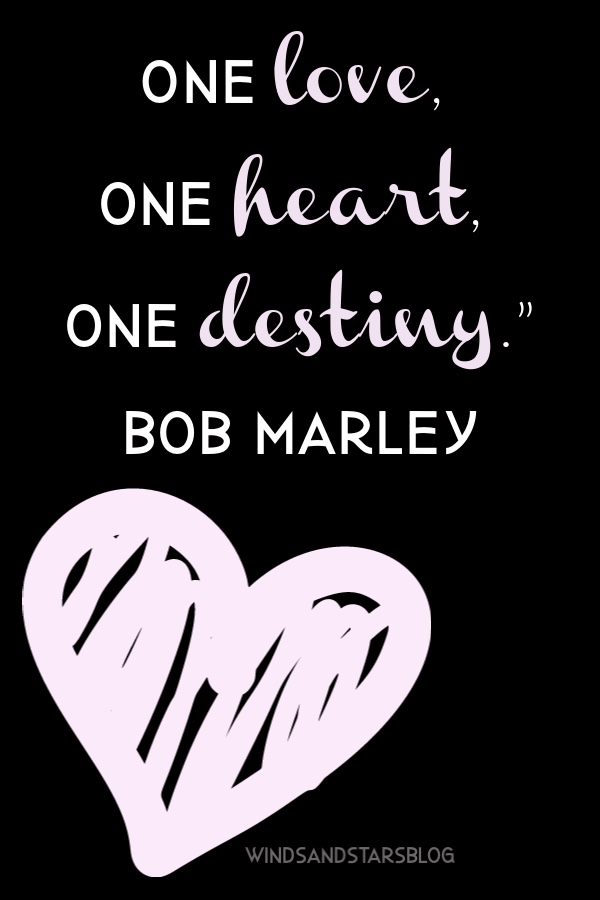Self-Preservation Gone Awry
Like all instincts, our self-preservation instinct is not always on pointe.
Self-preservation can be triggered by events that are not essential to our survival and thus misapplied or over-generalized. If we’re not aware that this is happening, our judgement and problem solving ability is impaired.
In “3 Strategies to Stop Worry From Ruining Your Life“, I wrote about the fight, flight, or freeze instinct that though integral to all living things, can also cause us to see threats where there are none. An important instinct years ago, it becomes hyper-active in today’s world of stimuli, and often reacts to threats that are not real, resulting in a debilitating approach to living.
In this day of information overload, it’s easy to get caught up in whatever sensationalized story is airing. Whether it’s on the news or perpetuated by social media. Much of it’s designed to appeal to our fears. Fear of losing our current way of life. Whether it’s economic prosperity, or privileges of race or gender, our self-preservation instinct is activated with alarming repercussions.
Purposeful Thinking Challenges Self-Preservation
As you go through your daily life, listen to the news, and read social media, think about how it applies to the future. What do you feel is at stake? Are you focused on what you may lose? Or what others may gain? When the discussion begins to center around what we’ll lose, it’s a red flag that the self-preservation instinct is active. If so, ask yourself if it’s a legitimate threat? Are you or your family or friends in immediate danger of starvation or violence? That after-all is the purpose of the instinct.
The 4 Bears and what they teach us about self-preservation
If you haven’t read my previous post where I tell 4 bear stories that this post builds upon, you can find it here.
Share Bear
In the first encounter, the bear wasn’t really driven by hunger. How do I know this? Because when we explored our food cache, the milk carton was ripped open and what hadn’t been slurped up was still dribbling into a puddle on the ground. Some of the eggs had cracked and broken in the fall. And a couple of them looked like the yolks had been halfheartedly sucked out. But the bacon was untouched. This bear saw opportunity. And it was habituated to food hanging in trees, took what it wanted and ambled away. It reminds me of when I wander to the fridge for a snack. It’s boredom, or anxiety, or procrastination, or sheer habit. Certainly not hunger.
Self-Preservation drives our fear
What also interests me when I reflect on this memory is that our fears, driven by self-preservation, were actually centered on the wrong thing. Incorrectly, we attributed the biggest threat to the drivers who delivered us to the campsite. Not an ambivalent bear. How easily our attention is misdirected by what we read, or hear, or watch on T.V. A good question to ask ourselves is what’s driving our fear? Or just as important. Who is driving our fear? Is it warranted? Is there good evidence?
Furthermore, we often play the short game rather than the long. We look for immediate threats and neglect the long term threats. Some of the true threats to our way of life is perpetuated by excess. Climate change, diminishing resources, diseases born of too much food and not enough exercise.
Err Bear
The bear who chased me out of the garden was also responding to instinct. When I researched why it charged toward me, I learned that a bear will defend its territory and chase out intruders. How do you know if you’re in claimed bear territory? Bear beds and evidence of feeding. Yup and yup. That bear was defending what it had claimed as its territory during our absence. Only it wasn’t his. However, once he’d asserted his claim, he was satisfied and wasn’t interested in me or my house.
Self-preservation will protect food sources, even if there isn’t an immediate need of it. As humans, we’re driven by this instinct even more because we can look to the future. Perceived threats to our survival cause us to react to events that we think may have a negative impact on our future selves. But what if we’re wrong? And how do we determine whether it’s a real or perceived threat? Furthermore, when does guarding our excess while others don’t get enough become morally wrong? When unchallenged, our self-preservation instinct always puts ‘me’ first. And our needs above the needs of others.
Sometimes we claim territory that isn’t ours to claim and then defend our rights to it.
This evidences itself in fears about race, gender, religion, values, and politics. We guard privilege and power as if our lives depend upon it. We dehumanize others and argue that if we don’t defend our rights, we will disappear. This is distorted self-preservation. We’re guarding what isn’t ours to guard. Freedom is allowing others the same rights we claim for ourselves.
Scare Bear
When our self-preservation instinct is hyper-sensitive, it’s often activated without justification. Our presence triggered the self-preservation instinct in the bear by the river, causing it to charge. When, as humans, we’re unaware of how this instinct operates, we’re at its whim and may find ourselves charging towards something that isn’t a threat.
Take the time to evaluate why you feel threatened and determine whether it’s something that is a true threat to your safety. For instance, psychology teaches us that we’re least threatened by those who are most like us and most threatened by those who are different. Knowing and understanding this enables us to be more accurate in determining why we feel threatened. Self-preservation causes us to over-generalize. We begin to see shadows and threats where there are none. And often don’t recognize the threat that’s right in front of us.
Nightmare Bear
The final bear in my first post was different. An autopsy showed that it was an older bear, around 25 years. And it was very skinny given it was so late in the season. Browsing on a normal diet of berries, roots, bugs, and small rodents, bears are eating machines throughout the summer, building their fat reserves in order to carry them through the winter hibernation. Puzzled by the aggressive and persistent nature of the attack, researchers hypothesized that throughout the summer, this bear was constantly pushed out of feeding territories by younger bears. Hungry and desperate it charged the woman. A desperation that caused it to act in ways that isn’t typical for bears. We’re familiar with the sow who defends her cubs. Or the bear defending its territory or food supply. What we don’t see often is this savagery born of desperation.
There’s several lessons to learn about self-preservation
One is that humans also get driven by desperation. So many people criticize those who embark on dangerous journeys with their children. I’m thinking specifically of the Honduran and Syrian refugees. Self-preservation leads us to do things we never thought possible. People fleeing danger and starvation will seek to obtain safety and food through dire measures.
Those of us who don’t know these stresses cannot pretend to understand the depth of their crisis. Without deliberately putting ourselves in their shoes, we cannot appreciate that no law will prevent you from trying when hope is all you have left. So complacent are we in our homes with not only food in the pantry but money in the bank that we can’t appreciate what it’s like to have nothing. Desperate people will engage in desperate measures even when faced with a wall and guns.
Hope says maybe it will be different for us.
When doing nothing guarantees starvation and death, would you not also seek a path of hope? Public displays of punishment doesn’t change behaviour. Tar and feathering and cutting off the hands of thieves did nothing to deter others. The prevalent thought, which some continue to believe today, was that public displays of punishments would deter others from committing these crimes. But it didn’t. Because what’s losing a hand when you steal food for your family when the alternative is watching them starve to death? Hope finds a path. Even when that path is fraught with danger.
A second lesson from the nightmare bear is how we respond to those in dire need.
Do we turn on our self-preservation instinct to full throttle and say tough luck? We have to think about ourselves? Or do we respond as the trees in the forest do when one of their members is in want of nutrition and water, and supply the needs knowing that helping one another strengthens the whole forest. Sometimes we’re so focused on whether we’re getting what we believe is rightfully ours that we neglect our responsibility. Our humanity crumbles amid this thinking.
Why these stories to talk about self-preservation?
Self-preservation is the thread that links these bear stories to us. And as humans, we too can resort to violent, erratic, or destructive behaviour if our very survival is at risk. In our misapplication of this instinct, we push others away, and out. And then feel justified in a crazy kind of circular reasoning when they push back.
Besides turning a blind eye to the desperate plights of people, self-preservation is over-generalized when we use it to protect our privilege. And seek to preserve our bloated life-style at the expense of others. We’re like the bear defending the garden that isn’t his to begin with. Recognizing both the good and the bad of the self-preservation instinct can help us make better decisions and defend what’s right instead of ‘what’s mine’.
Our world is fractured by the inequities that so many of us want to defend. Our hope in a better tomorrow lies in being able to support everyone in finding the basic needs of food, shelter, and safety. Just as the trees look after their weakest members in order to strengthen the whole community, we need to be less concerned with defending our rights and instead look after each other.
Ironically, it’s through those actions that the values and rights we hold dear will gain authenticity and power.
Hatred paralyzes life; love releases it. Hatred confuses life; love harmonizes it. Hatred darkens life; love illuminates it.
Martin Luther King Jr.
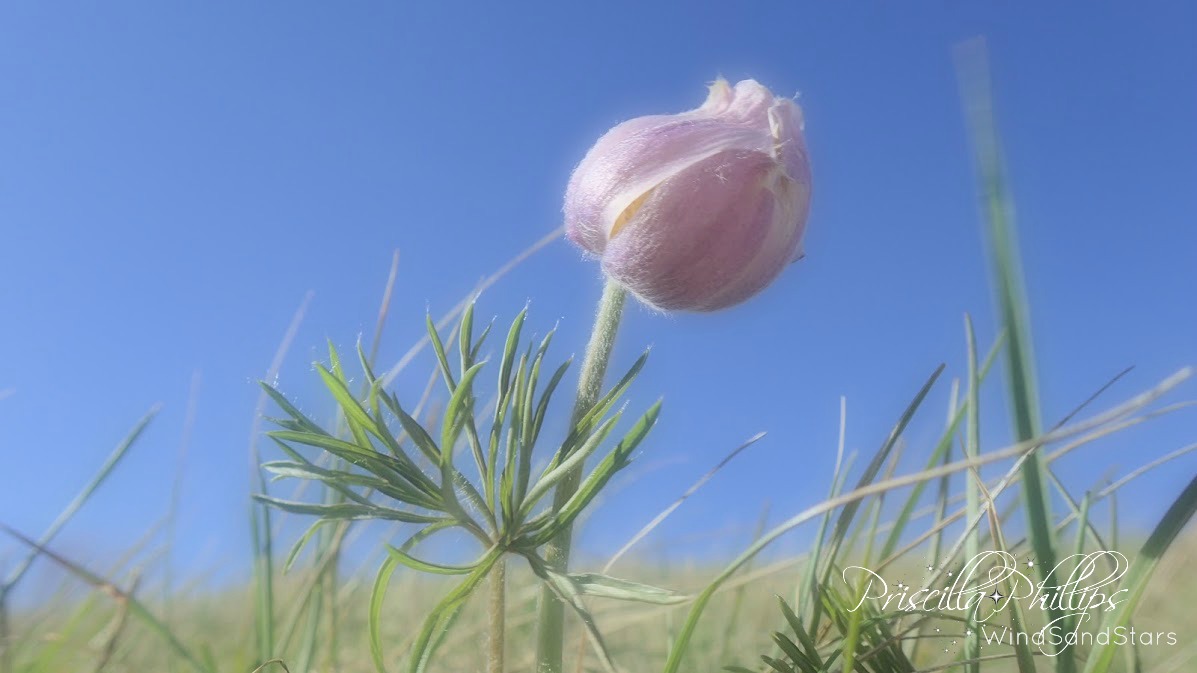
Yes! I want to receive your newsletter!
Simply …
P.S. Thanks for reading to the end of this post. I’m taking the summer off to work on another project and to do some camping and spend time with family and friends. I will send out an occasional newsletter, so if you haven’t signed up, please do! Have a wonderful, relaxing summer!
